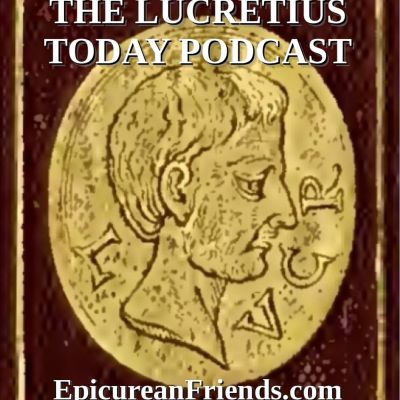Lucretius Today is a podcast dedicated to learning Epicurean philosophy through study of the poet Lucretius, who lived in the age of Julius Caesar and wrote "On The Nature of Things," the only complete presentation of Epicurus' ideas left to us from the ancient world. We'll walk you line by line through the six books of Lucretius' poem, and we'll discuss how Epicurean philosophy can apply to you today. In this podcast we won't be talking about modern political issues. How you apply Epicurus in your own life is entirely up to you. Over at the Epicureanfriends.com web forum, we apply this approach by following a set of ground rules we call "Not Neo-Epicurean, But Epicurean." Epicurean philosophy is not a religion, it''s not Stoicism, it's not Humanism, it's not Libertarianism, it's not Atheism, and it's not Marxism or any other philosophy - it is unique in the history of Western Civilization, and as we explore Lucretius's poem you'll quickly see how that is the case. The home page of this podcast is LucretiusToday...
http://Epicureanfriends.com
Episode 001 - Venus / Pleasure As Guide Of Life
The text we cover in Episode One is as follows from the 1743 Daniel Browne Edition. This starts with line one of Book One and goes approximately to Latin line 60. Discussion of this episode will take place here.
MOTHER of Rome, Delight of Men and Gods, Sweet Venus; who with vital power does fill the sea bearing the ships, the fruitful Earth, all things beneath the rolling signs of Heaven; for it is by Thee that creatures of every kind conceive, rise into life, and view the Sun’s bright beams. Thee, Goddess, Thee the winds avoid; the clouds fly Thee and Thy approach. With various art the Earth, for Thee, affords her sweetest flowers; for Thee the sea’s rough waves put on their smiles, and the smooth sky shines with diffused light. For when the buxom Spring leads on the year, and genial gales of western winds blow fresh, unlocked from Winter’s cold, the airy birds first feel Thee, Goddess, and express thy power. Thy active flame strikes through their very souls. And then the savage beasts, with wanton play, frisk over the cheerful fields, and swim the rapid streams. So pleased with thy sweetness, so transported by thy soft charms, all living Nature strives, with sharp desire, to follow Thee, her Guide, where Thou art pleased to lead. In short, Thy power, inspiring every breast with tender love, drives every creature on with eager heat, in seas, in mountains, in swiftest floods, in leafy forests, and in verdant plains, to propagate their kind from age to age.
Since Thou, alone, doest govern Nature’s laws, and nothing, without Thee, can rise to light, without Thee nothing can look gay or lovely; I beg Thee a companion to my lays, which now I sing of Nature, and I devote to my dear Memmius, whom Thou art ever pleased, sweet Goddess, to adorn with every grace. For him, kind Deity, inspire my song, and give immortal beauty to my verse. Meantime, the bloody tumults of the war, by sea and land, compose, and lay asleep. For Thou, alone, mankind, with quiet peace, canst bless; because it is Mars Armipotent that rules the bloody tumults of the war, and He, by everlasting pains of love, bound fast, tastes in Thy lap most sweet repose, turns back his smooth long neck, and views thy charms, and greedily sucks love at both his eyes. Supinely, as he rests, his very soul hangs on thy lips. This God, dissolved in ease, in the soft moments when thy heavenly limbs cling round him, melting with eloquence, caress, great Goddess, and implore a peace for Rome.
For neither can I write with cheerful strains, in times so sad, nor can the noble House of Memmius desert the common good in such distress of things. The hours you spare, apply with close attention to my verse, and, free from care, receive true reason’s rules; nor these my gifts, prepared with faithful pains, reject with scorn before they are understood. For I begin to write of lofty themes, of Gods, and of the motions of the sky, the rise of things, how all things Nature forms, and how they grow, and to perfection rise, and into what, by the same Nature’s laws, those things resolve and die; which as I write I call by various names; sometimes it is matter, or the first principles, or seeds of things, or first of bodies, whence all else proceed.
For the whole nature of the Gods must spend an Immortality in softest peace, removed from our affairs, and separated by distance infinite; from sorrow free; secure from danger; in its own happiness sufficient, and nothing of ours can want, is neither pleased with good, nor vexed with evil.
